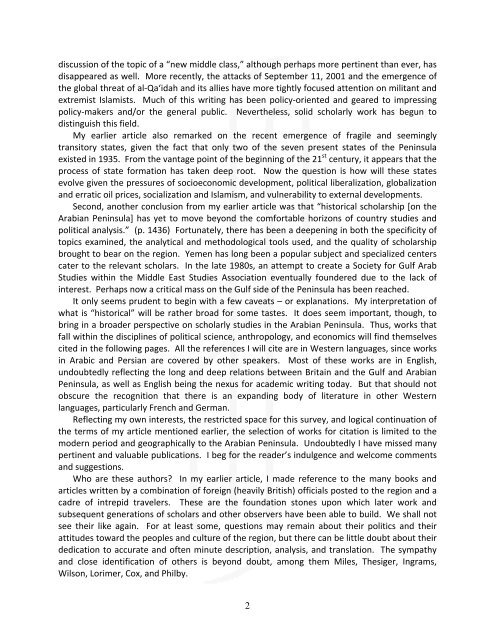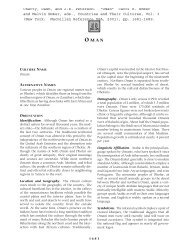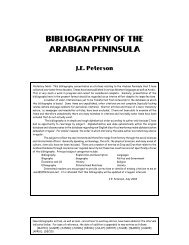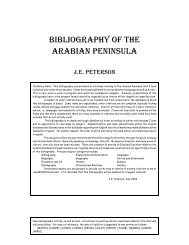THE ARABIAN PENINSULA IN MODERN TIMES: A - JEPeterson.net
THE ARABIAN PENINSULA IN MODERN TIMES: A - JEPeterson.net
THE ARABIAN PENINSULA IN MODERN TIMES: A - JEPeterson.net
You also want an ePaper? Increase the reach of your titles
YUMPU automatically turns print PDFs into web optimized ePapers that Google loves.
discussion of the topic of a “new middle class,” although perhaps more pertinent than ever, has<br />
disappeared as well. More recently, the attacks of September 11, 2001 and the emergence of<br />
the global threat of al‐Qa‘idah and its allies have more tightly focused attention on militant and<br />
extremist Islamists. Much of this writing has been policy‐oriented and geared to impressing<br />
policy‐makers and/or the general public. Nevertheless, solid scholarly work has begun to<br />
distinguish this field.<br />
My earlier article also remarked on the recent emergence of fragile and seemingly<br />
transitory states, given the fact that only two of the seven present states of the Peninsula<br />
existed in 1935. From the vantage point of the beginning of the 21 st century, it appears that the<br />
process of state formation has taken deep root. Now the question is how will these states<br />
evolve given the pressures of socioeconomic development, political liberalization, globalization<br />
and erratic oil prices, socialization and Islamism, and vulnerability to external developments.<br />
Second, another conclusion from my earlier article was that “historical scholarship [on the<br />
Arabian Peninsula] has yet to move beyond the comfortable horizons of country studies and<br />
political analysis.” (p. 1436) Fortunately, there has been a deepening in both the specificity of<br />
topics examined, the analytical and methodological tools used, and the quality of scholarship<br />
brought to bear on the region. Yemen has long been a popular subject and specialized centers<br />
cater to the relevant scholars. In the late 1980s, an attempt to create a Society for Gulf Arab<br />
Studies within the Middle East Studies Association eventually foundered due to the lack of<br />
interest. Perhaps now a critical mass on the Gulf side of the Peninsula has been reached.<br />
It only seems prudent to begin with a few caveats – or explanations. My interpretation of<br />
what is “historical” will be rather broad for some tastes. It does seem important, though, to<br />
bring in a broader perspective on scholarly studies in the Arabian Peninsula. Thus, works that<br />
fall within the disciplines of political science, anthropology, and economics will find themselves<br />
cited in the following pages. All the references I will cite are in Western languages, since works<br />
in Arabic and Persian are covered by other speakers. Most of these works are in English,<br />
undoubtedly reflecting the long and deep relations between Britain and the Gulf and Arabian<br />
Peninsula, as well as English being the nexus for academic writing today. But that should not<br />
obscure the recognition that there is an expanding body of literature in other Western<br />
languages, particularly French and German.<br />
Reflecting my own interests, the restricted space for this survey, and logical continuation of<br />
the terms of my article mentioned earlier, the selection of works for citation is limited to the<br />
modern period and geographically to the Arabian Peninsula. Undoubtedly I have missed many<br />
pertinent and valuable publications. I beg for the reader’s indulgence and welcome comments<br />
and suggestions.<br />
Who are these authors? In my earlier article, I made reference to the many books and<br />
articles written by a combination of foreign (heavily British) officials posted to the region and a<br />
cadre of intrepid travelers. These are the foundation stones upon which later work and<br />
subsequent generations of scholars and other observers have been able to build. We shall not<br />
see their like again. For at least some, questions may remain about their politics and their<br />
attitudes toward the peoples and culture of the region, but there can be little doubt about their<br />
dedication to accurate and often minute description, analysis, and translation. The sympathy<br />
and close identification of others is beyond doubt, among them Miles, Thesiger, Ingrams,<br />
Wilson, Lorimer, Cox, and Philby.<br />
2







